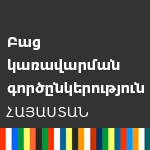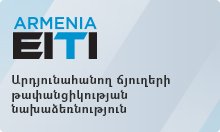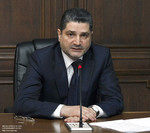ուրբաթ, 30 հոկտեմբերի 2009
RA Prime Minister Tigran Sargsyan’s Statement in the National Assembly
Honorable President of the National Assembly,
Dear Colleagues,
As usual, I shall try to give an estimate of the current situation and analyze the 2009 budget performance before proceeding to the debate on the 2010 State budget bill.
As you know, government activities stemmed from the program of anti-crisis action in 2009, which I submitted to the National Assembly last November and which was published both in the local press and on the website of the government. Our main target consisted in ensuring macroeconomic and financial stability to meet any such challenge as might turn up with the global crisis. Also, we had to create satisfactory conditions for sustainable development and the building of a qualitatively new economic framework in future. Now, let us look back at those emergency measures implemented so far.
1. Development of key infrastructures of regional importance. This was the anti-crisis target number one as investments in infrastructure are thought to be the most effective ones amid crisis, which create a highly favorable environment for the development of the private sector.
The first major infrastructure project on this list is the task set by the President of the Republic associated with the preparations for a new NPP construction. An interdepartmental task force has been established. You may be aware that “Warley Parsons” has been chosen to prepare a feasibility study for the Plant. USD 400 000 has already been spent to that effect. The National Assembly has passed a law on the construction of a second nuclear unit (reactor).
2. 365 km-long road sections will have been completed or rebuilt by the end of this year against last year’s actual mark of 163 kilometers. About AMD 5.3 BN worth of activities have been carried out under the Millenium Challenge Program, of which a 24.5 km-long road section on Armavir-Isahakyan-Gyumri highway has already been commissioned with a total cost of 1.5 billion drams.
3. AMD 14 billion worth of activities have been carried out to upgrade Armenia’s water supply system. A total of 300 km-long inner network and over 50 pumping stations have been restored to date. AMD 14 billion will be spent against last year’s 10.4 billion drams.
4. Around AMD 25.1 billion will be have been spent in the disaster zone by the end-of-year: 1760 flats, 118 thousand square meter housing estate will be built up, with 403 million dram worth of HPC to be offered to households. No construction work was carried out in the earthquake zone during 2008, with 2 184 million dram worth of HPC offered to the population, which means that the share of disaster zone expenditures in overall public spending increased considerably in 2009.
5. Design work is off under the North-South transport corridor project. You are aware that the Asian Development Bank has approved a USD 500 MN loan facility, the first tranche of which to the amount of USD 60 million has already been disbursed to the Recipient.
6. Specific steps are planned under the Iran-Armenia railway project. An agreement stating that there is a political will for the construction of the railway was signed during RA President’s recent visit to Iran. A duly budgeted closed joint-stock company has been established referred to as “Railway Construction Directorate.”
7. The Pan-Armenian Bank will start operating in 2010. The CBA has passed a command with an authoritative specialized international company to choose a director. A business plan for the Pan-Armenian Bank is being drafted by other authoritative specialized international companies.
I gave the list of the first stage steps under our anti-crisis program covering major infrastructure-related spending.
8. Underpinning small and medium-size enterprise is the second target of our anti-crisis program. The role of the SME DSC was prioritized in this respect, and we created a new tool – a universal lending entity – which was supposed to assist the State with the promotion of SME. The following resources have been used for support of SME:
9.
• AMD 18.5 BN - funneled through the banking system
• AMD 3.7 BN and AMD 6.4 BN - allocated to SME DSC and UWK respectively
• The Armenian-German Bank received 17 billion drams from the KfW Bank
• As a pilot project, an organization co-supported by the State and private companies was established to help domestic cheese producers find sales outlets abroad. Nearly 500 entities will get support under this project and, if successful, this experience will be applied to other fields of activity.
2. Lowering the tax burden in an effort to underpin small and medium-size enterprises. As a result, AMD 16.6 billion worth of savings were recorded with several thousands of taxpayers to give them more resistibility against depression. This means that as much revenue failed to be collected due to the tax privileges applicable. In particular, flat rates have come to be applied to some types of services /non-qualified hotel facilities/. As a result, AMD 5.6 billion worth of savings were recorded with economic entities.
• The threshold of VAT has been raised to AMD 58.3 million. As a result, AMD 11 billion worth of savings were recorded with economic entities. Note that this regime benefits about 32 thousand domestic companies.
• In 2009 tax overpayments fell by AMD 20 billion, as compared to 2008, leading to a tangible alleviation in the tax burden and providing another serious tool against the crisis.
• Hand-made tapestry was freed from all types of taxes.
Tax Administration
• Jointly with you, we have called off the mandatory accounting requirement for those enterprises with less than AMD 100 MN annual turnover.
• Enterprises with less than AMD 100 MN annual turnover no longer need to produce monthly VAT returns.
• Simplified tax return forms were introduced: the former evaluation commissions were eliminated, and the taxpayers were allowed to submit their returns by mail or through special boxes available at local tax inspectorates.
• In 2009, those companies with less than AMD 70 MN annual turnover were exempted from the mandatory checkups carried out by over 22 supervisory bodies.
• A State-subsidized accounting support center was established to provide private clients with cost-effective accounting services.
• The FREDA venture fund was launched to provide development lending and equity sharing in agricultural enterprises.
10. Measures aimed at shaping a competitive business environment
It seems to be obvious that transparency should be imposed upon the activities of larger enterprises, and we are introducing the mandatory audit requirement in order to build up public trust in major businesses. These measures include:
• Licensing of retail and wholesale trade centers.
• Application of higher rates of lump-sum taxes for the casinos and other gambling institutions and extended AGRS coverage by taking the gas receipt level rather than the realization level as a basis for calculation.
• Customs broker’s offices and self-declaration desks are now available at customs houses and warehouses, meant to reduce and minimize “the contact area” between importers and customs officers.
• The list of those products subject to mandatory certification at the time of border-crossing was shortened from 65 to only 16.
• Export formalities were simplified both in respect of paperwork and procedures, in particular for agricultural produce, drugs and pharmaceutical products.
• Adherence to the GSP+ system which will reduce clearance costs.
• Serious steps were taken towards improving the system of public procurement, which hare supposed to provide for tangible savings in this area.
The aforementioned measures have already yielded a positive outcome. In particular, Armenia’s standing was improved by 7 points under the World Bank’s Doing Business standards from 50 to 43.
11. Targeted support for the real sector
• VAT settlements will be deferred for a period of up till 3 years, in case equipment is imported to a total cost of AMD 300 million and over.
• To boost the real sector, the government buys out corporate equity, as well as provides State guarantees and applies subsidizing tools for domestic producers, especially system-building enterprises. In particular, the Operative Staff has approved 44 projects of a total budget of 14 billion drams. In addition, USD 79 MN worth of dram-denominated lending resources have been made available to mining enterprises and HayRusGasArd CJSC
• About AMD 29 billion was spent in the energy sector during 2009 against last year’s 19.8 billion drams
• 30 billion drams were made available to the real sector from the proceeds of the Russian credit, targeting economic recovery and diversification measures. Additional 12 billion drams went towards the creation of UWK CJSC under the National Mortgage Fund with the view of stimulating housing market demand.
• These anti-crisis action areas go hand-in-hand with the ones addressed in the social sector.
12. Compliance with the social commitments
• The State budget envisaged strict and unaltered implementation of planned social expenditures. Furthermore, social spending rose by 14% in 2009 as compared to that of 2008. Our social commitments have been complied with in full.
• Actual spending in the sphere of education will be AMD 108.9 billion against last year’s 104.5 billion drams.
• Health care spending will stand at AMD 56.5 BN as compared to 49.4 billion in 2008.
Despite the economic downturn, social expenditures have been increased considerably.
13. Macroeconomic stability
• We have chosen a policy line which to our mind had no alternative: we abode by expansionary fiscal and monetary policies which allowed us to escape the price fall and build up adequate liquidity necessary for the strengthening of the financial system and economic recovery. In particular, budget expenditure shall rise to nearly AMD 880 BN in 2009 against last year’s 810 billions, with the deficit estimated at 7.0-7.5% of GDP.
• Inflation will be maintained within the projected level, namely 4% + 1.5%.
• We did not carry out budget cuts as a result of structural changes. Instead we embraced expansionary fiscal policy which was assessed as very effective and well-advised by international experts.
• Noteworthy is that expansionary policies and improved tax administration led to a 0.8% increase in retail trade turnover in January-September against a background of 18.3% economic fall recorded in the same period. This means that those resources left in the economy allowed our consumers to keep up the consumption level.
Backed by propitious macroeconomic start-up conditions, we were assisted by international donors in 2009, including a USD 500 MN loan from the Russian Federation. These means will first of all be used to establish a stabilization fund, supposed to build up sufficient reserve for defying new challenges in 2010-2011, as well as for meeting some recurrent expenses, in particular, in the disaster zone. The funds available from the World Bank, the Asian Development Bank, the International Monetary Fund and the European Bank will help address the budgetary gap in 2009-2010.
All of these actions will be attended by the following key measures:
• enhanced State apparatus efficiency
• introduction of a performance-based system
• sharp increase in public governance transparency
• strict monitoring of the anti-crisis program by the government, the National Assembly and the public-at-large
The lessons of 2009
First, the crisis allowed a more vivid exposure of weak points in our economy:
• The economy is poorly diversified with badly needed “long-term money” and institutions running on it. The latter fact in turn is an impediment to diversification.
• There are economic oligopolies available in the country and, as a result, a low level of competition. This can be evidenced as well by low price elasticity which is a serious challenge to us.
• Motivation mechanisms are insufficient in the public sector.
• We face fundamental problems in want of a solution in the educational and health care systems.
Therefore, all our efforts will be addressing the aforementioned problems in 2010.
Now, let us look at the key State budget indicators of 2010. The first widely criticized issue of common concern is the government’s failure to come up with accurate forecasts for both 2009 and 2010. Note that any crisis stands out in that it can blow up all acknowledged rules and regulations. The modern economic science lacks in a comprehensive toolkit enabling it to assess the magnitude and the pace of a crisis, neither can experts predict the exact timing of economic recovery. This is just the essence of any crisis.
You may understand that in the summer of 2008 as we were drafting this year’s budget, no one could make forecasts about economic developments worldwide and in Russia, in particular, which influences greatly Armenia’s macroeconomic status.
It seems to be the case today. While experts follow closely the situation, the World Bank, the International Monetary Fund and the developed countries keep reconsidering the forecasts from month to month. Predictions are updated every month, macroeconomic indices keep changing and sometimes drastically. Those taken as a basis during the 2010 budget exercise proceeded from the assumptions made at the time of drafting that is from the ones based on the predictions available from the World Bank, the International Monetary Fund, the Russian Federation, and we are compelled to follow them as they are liable to changes. This means that we all must work under pressure. I wish to note that some amendments have been made since the time the bill was drafted. We will of course make certain amendments during the parliamentary debates, and the bill will have the last 3 months’ updates by the time it is brought to your attention.
At this point, as the revenue and expenditure sides of the budget are stated at the level of AMD 676.7 BN and AMD 859.7 BN respectively, we should also allow for the funds available from the Millenium Challenge Account as the talks with the MCC are complete, and we have our US partners’ assurances that all the projects will be implemented in full. The budget bill will be amended accordingly.
This means that the expenditures in 2010 will be comparable to those of 2009 in respect of volume. The budget bill implies a 12% economic growth as estimated based on the global and Russian forecasts. We are hopeful to be able to maintain last year’s mark of welfare spending, which is a key target in the 2010 State budget.
The budget deficit/GDP ratio can go down a bit which is at the focus of public attention.
The government raised the share of welfare spending by 14% in the budget of 2009 and is going to uphold this level in 2010.
The budgetary gap is largely financed by international donors sparing us a lot of market-related risks. Moreover, economic developments worldwide oblige the World Bank, the IMF and the Asian Bank to restructure Armenia’s foreign debt, and we will be in a position to alleviate the debt pressure on budget outturn in future. Debt restructuring negotiations with the IMF will kick off in the first quarter of 2010. Note that the Fund will keep by the same policy line with regard to other debtor countries as well. Talks are underway with the World Bank and the Asian Bank with a view to having better borrowing conditions for our country. In this respect, we face no market risks whatsoever simply because delayed economic recovery will lead to easier terms for debt repayment as negotiated with the World Bank, the Asian Bank and the EBRD.
The budget receipts were projected to the level of AMD 533 BN in the 2010 budget bill against last year’s target of 500 billion drams. Of course, if we have better growth indicators, we will manage not only to meet this target but also to exceed it. In parallel, we are building up reserves in the CBA-based Stabilization Fund in case economic indices may prove worse than expected. This makes us feel confident that the expenditures projected for the fiscal year 2010 will be met in full.
We must continue with our expansionary policy line in 2010 in order to assist the private sector with their anti-crisis endeavors.
The local self-government financing base will improve in 2010 as compared to 2009, with the overall level of appropriations due to go up by 17% next year to AMD 32.5 BN, in line with the law on local self-government.
We make a point of extending a security-oriented assistance to the government of the Nagorno-Karabakh Republic, which will rise to AMD 31 BN in 2010.
The present bill will allow us to realize all of the above-stated actions. In particular, we will continue supporting small and medium-size businesses, system-building enterprises, as well as facilitating export procedures in an effort to underpin domestic exporters.
The specified anti-crisis measures will be carried over into next year as we shall try to provide more favorable conditions for doing business at home through continued implementation of tax and customs reforms. Our actions are meant to provide incentives to local entrepreneurs.
The Government highlights the pension and insurance reforms.
Legislative packages have already been submitted to the National Assembly, and meetings have been held with the heads of parliamentary commissions. The draft laws have been put up for public discussion, and the Government has approved a time-table for such discussions as these are crucial in terms of ensuring long-term financial resources and building up new institutions aimed at economic diversification.
The following reforms are envisaged in the system of public governance:
• Structural and functional reform of public governance.
A new concept is out to mark the second stage of public sector reform at which ministry, government department and agency functions will be clarified and separated. These are revolutionary changes concerning the system of public governance. Strongly backed from abroad, they were initiated as early as 6 years ago, and we feel now that the time has come to proceed to the second and decisive stage of reform, supposed to increase governance efficiency considerably with clear-cut functions and responsibilities, as well as appropriate feedback defined for ministers, chiefs of staff, heads of units, agency inspectors.
The health care and educational reforms have entered a decisive stage.
In cooperation with the National Assembly commission, we have already approved 9 fundamental actions in the sphere of public health care.
Those financial mechanisms applicable in the health care system must improve in quality. The State must be strict in its functions which as controlled by the National Assembly and the public-at-large, should be easily perceived by all stakeholders, both public and private.
Similar actions are to be implemented in the sphere of education. There is a strict assignment on the part of the RA President calling for improved mechanisms for State order application in 2010.
Having the active contribution of said newborn institutions, we will continue with our anti-crisis efforts and will keep on building up capacity in this field.
I hereby tried to outline those basic principles underlying the 2010 State budget implementation policy.
Thank you.








